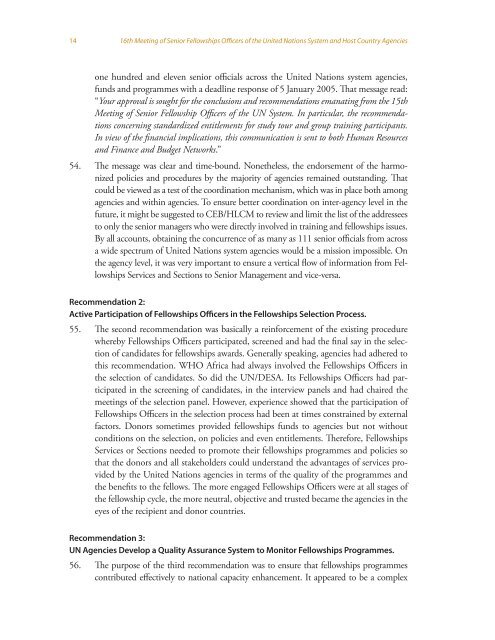16th Meeting of Senior Fellowships Officers of the ... - Development
16th Meeting of Senior Fellowships Officers of the ... - Development
16th Meeting of Senior Fellowships Officers of the ... - Development
Create successful ePaper yourself
Turn your PDF publications into a flip-book with our unique Google optimized e-Paper software.
14<br />
<strong>16th</strong> <strong>Meeting</strong> <strong>of</strong> <strong>Senior</strong> <strong>Fellowships</strong> <strong>Officers</strong> <strong>of</strong> <strong>the</strong> United Nations System and Host Country Agencies<br />
one hundred and eleven senior <strong>of</strong>ficials across <strong>the</strong> United Nations system agencies,<br />
funds and programmes with a deadline response <strong>of</strong> 5 January 2005. That message read:<br />
“Your approval is sought for <strong>the</strong> conclusions and recommendations emanating from <strong>the</strong> 15th<br />
<strong>Meeting</strong> <strong>of</strong> <strong>Senior</strong> Fellowship <strong>Officers</strong> <strong>of</strong> <strong>the</strong> UN System. In particular, <strong>the</strong> recommendations<br />
concerning standardized entitlements for study tour and group training participants.<br />
In view <strong>of</strong> <strong>the</strong> financial implications, this communication is sent to both Human Resources<br />
and Finance and Budget Networks.”<br />
54. The message was clear and time-bound. None<strong>the</strong>less, <strong>the</strong> endorsement <strong>of</strong> <strong>the</strong> harmonized<br />
policies and procedures by <strong>the</strong> majority <strong>of</strong> agencies remained outstanding. That<br />
could be viewed as a test <strong>of</strong> <strong>the</strong> coordination mechanism, which was in place both among<br />
agencies and within agencies. To ensure better coordination on inter-agency level in <strong>the</strong><br />
future, it might be suggested to CEB/HLCM to review and limit <strong>the</strong> list <strong>of</strong> <strong>the</strong> addressees<br />
to only <strong>the</strong> senior managers who were directly involved in training and fellowships issues.<br />
By all accounts, obtaining <strong>the</strong> concurrence <strong>of</strong> as many as 111 senior <strong>of</strong>ficials from across<br />
a wide spectrum <strong>of</strong> United Nations system agencies would be a mission impossible. On<br />
<strong>the</strong> agency level, it was very important to ensure a vertical flow <strong>of</strong> information from <strong>Fellowships</strong><br />
Services and Sections to <strong>Senior</strong> Management and vice-versa.<br />
Recommendation 2:<br />
Active Participation <strong>of</strong> <strong>Fellowships</strong> <strong>Officers</strong> in <strong>the</strong> <strong>Fellowships</strong> Selection Process.<br />
55. The second recommendation was basically a reinforcement <strong>of</strong> <strong>the</strong> existing procedure<br />
whereby <strong>Fellowships</strong> <strong>Officers</strong> participated, screened and had <strong>the</strong> final say in <strong>the</strong> selection<br />
<strong>of</strong> candidates for fellowships awards. Generally speaking, agencies had adhered to<br />
this recommendation. WHO Africa had always involved <strong>the</strong> <strong>Fellowships</strong> <strong>Officers</strong> in<br />
<strong>the</strong> selection <strong>of</strong> candidates. So did <strong>the</strong> UN/DESA. Its <strong>Fellowships</strong> <strong>Officers</strong> had participated<br />
in <strong>the</strong> screening <strong>of</strong> candidates, in <strong>the</strong> interview panels and had chaired <strong>the</strong><br />
meetings <strong>of</strong> <strong>the</strong> selection panel. However, experience showed that <strong>the</strong> participation <strong>of</strong><br />
<strong>Fellowships</strong> <strong>Officers</strong> in <strong>the</strong> selection process had been at times constrained by external<br />
factors. Donors sometimes provided fellowships funds to agencies but not without<br />
conditions on <strong>the</strong> selection, on policies and even entitlements. Therefore, <strong>Fellowships</strong><br />
Services or Sections needed to promote <strong>the</strong>ir fellowships programmes and policies so<br />
that <strong>the</strong> donors and all stakeholders could understand <strong>the</strong> advantages <strong>of</strong> services provided<br />
by <strong>the</strong> United Nations agencies in terms <strong>of</strong> <strong>the</strong> quality <strong>of</strong> <strong>the</strong> programmes and<br />
<strong>the</strong> benefits to <strong>the</strong> fellows. The more engaged <strong>Fellowships</strong> <strong>Officers</strong> were at all stages <strong>of</strong><br />
<strong>the</strong> fellowship cycle, <strong>the</strong> more neutral, objective and trusted became <strong>the</strong> agencies in <strong>the</strong><br />
eyes <strong>of</strong> <strong>the</strong> recipient and donor countries.<br />
Recommendation 3:<br />
UN Agencies Develop a Quality Assurance System to Monitor <strong>Fellowships</strong> Programmes.<br />
56. The purpose <strong>of</strong> <strong>the</strong> third recommendation was to ensure that fellowships programmes<br />
contributed effectively to national capacity enhancement. It appeared to be a complex

















